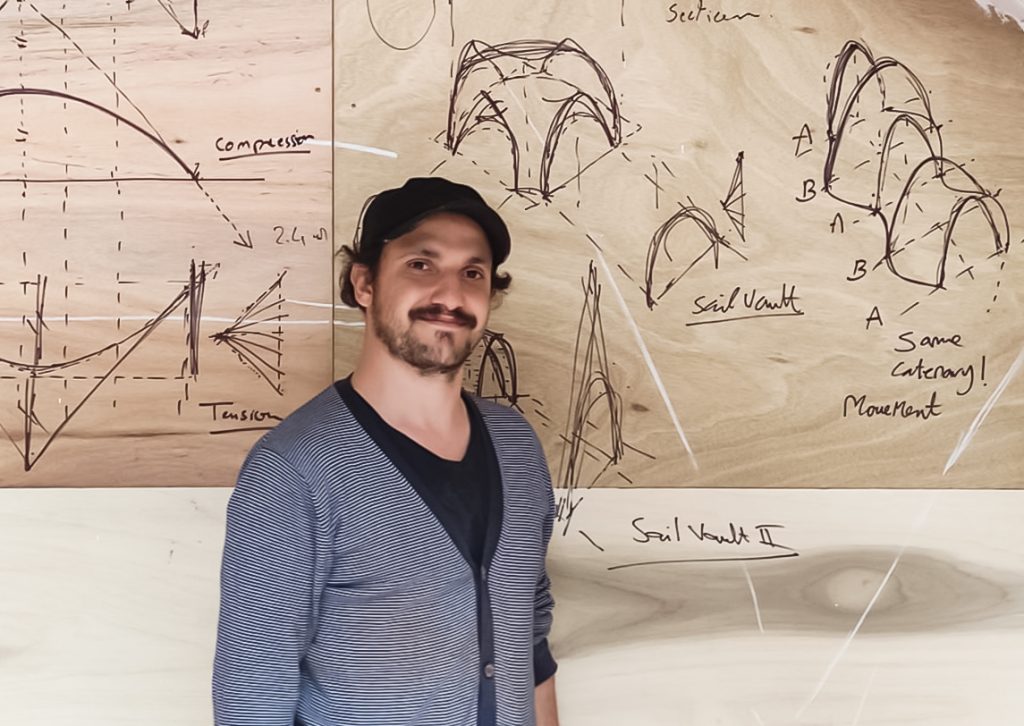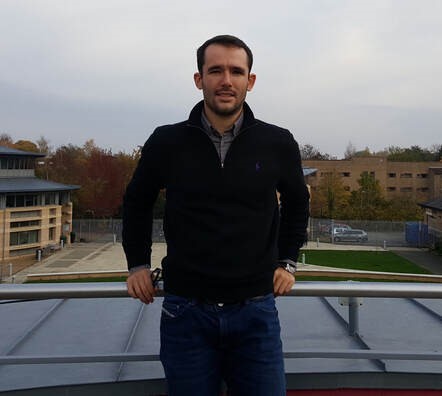Tutorial news: Salje Medals awarded to Dr Wesam Al Asali and Dr Matteo Giordano
Clare Hall graduates, Dr Wesam Al Asali and Dr Matteo Giordano, have been awarded the Salje Medal for their PhD theses.
Two medals are awarded by the College each year to the most outstanding PhD (1) in the Arts and Humanities and (2) in the Sciences. Learn about their research here:

Dr Wesam Al Asali
In my research and architecture practice, I am interested ways to combine digital tools with vernacular building crafts for affordable and sustainable construction. My doctoral thesis examines this possibility in thin-tile vaulting - a Mediterranean ceiling-craft technique that employs less material, but more skill, than the conventional slab of reinforced concrete. Learning from historical, ethnographic, and design case studies, my research deduces three approaches to achieve craft-inclusive construction: policy, training, and design.
The policy approach is extracted from two historical studies on the industrialisation of thin-tile vaults in Cuba during 1960s and Syria during the 1980s. The training approach relies on an ethnographic study that examines training programmes of vaulting during the construction of three thin-tile vault projects in Rwanda, Jordan and Spain. Learning from the two previous aspects, the approach to design uses design-build methodologies to explore how digital analysis tools can explore new material, off-site manufacturing, and recyclable formwork for vaults.
My PhD finds that construction for environmental resilience in the era of climate crisis operates within the same limitations as building crafts. However, the area of dialogue between the two is usually excluded from the discussion about sustainable building policies as it is inherently difficult to be abstracted into codes. The thesis concludes that architectural design can play a decisive role in bridging this gap. At a policy level, architects can demystify building crafts through digital modelling. At a design level, they can develop construction tools in conversation with craftspeople to help the latter find new possibilities of their craft, build faster, or build more efficiently.
Just like architecture as a discipline, my doctoral thesis sits at the intersection between humanities and the sciences, which was both challenging and rewarding. I enjoyed working with artisans as much as running load-test experiments in the Engineering lab. All this range of activities would not have been possible without the support of many people, especially my supervisor Professor Michael Ramage, head of the Centre for Natural Material Innovation. I would also like to thank my examiners, Dr John Orr and Professor Santiago Huerta for the fruitful and rich discussions during my Viva.
I feel honoured that my thesis has won the Salje Medal; it means so much to me, as Clare Hall was home for the majority of our stay in Cambridge. The College’s architecture by Ralph Erskine is in itself a source of inspiration, and it does illustrate how architecture technology can also be humane. I roamed the College’s passages and Heschel Road countless times thinking about an experiment or paper. I truly thank all tutors and Fellows for their trust. Finally, I’m pleased to share that CERCAA has been developed from my PhD as a space that brings architects and building artisans togather to exchange ideas about sustianable construction.

Dr Matteo Giordano
During my time as a Clare Hall student I undertook a PhD in Mathematical Statistics. The purpose of my PhD thesis, and of my current research activity as postdoctoral researcher, is to investigate the mathematical properties of Bayesian statistical methods applied to estimation problems involving complex real-world systems. Often in applications the behaviour of a physical system can be described by a mathematical model. When data is collected from the system, it is then of interest - for the purpose of scientific investigation or to make predictions about its future behaviour - to estimate the parameters that govern such models.
Bayesian statistics offers a principled and computationally attractive approach to these kinds of inferential problems. Among the advantages, modern sampling algorithms allow an efficient implementation of Bayesian inference even for complex systems governed by involved models. Furthermore, unlike other statistical procedures, Bayesian methods automatically deliver a ‘quantification of the uncertainty’ in the obtained estimates, allowing the construction of ‘confidence intervals’ used to reject or accept scientific hypotheses.
Despite the practical success, we still have a relatively limited understanding of the theoretical properties of Bayesian methods in complex statistical models. In my research, I investigate what mathematical guarantees can be provided about the ‘convergence’ of these estimation techniques towards the desired quantity to be estimated, ruling out the possibility of wrong or imprecise inferences. Among all such ‘consistent’ procedures, one can then further investigate the precise rate of convergence at which a particular Bayesian method recovers the ground truth, and possibly conclude, thanks to the theory of statistical ‘optimality’, that no other estimation procedure can achieve a faster convergence. Once such optimality is established, a practitioner can trust the Bayesian algorithm at hand to deliver the most accurate inferences that, in view of the intrinsic randomness in the studied phenomenon, is mathematically possible.
I am profoundly honoured to have been awarded the Salje Medal in the Sciences, and I would like to extend my most sincere gratitude to the Selection Committee. Clare Hall has not just been a home for me during my PhD, but also a constant source of inspiration thanks to its vibrant community of world-class researchers and brilliant students. To distinguish myself within such company is both humbling and deeply gratifying, and it gives me an extraordinary motivation to continue to pursue my research in the future.